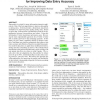Free Online Productivity Tools
i2Speak
i2Symbol
i2OCR
iTex2Img
iWeb2Print
iWeb2Shot
i2Type
iPdf2Split
iPdf2Merge
i2Bopomofo
i2Arabic
i2Style
i2Image
i2PDF
iLatex2Rtf
Sci2ools
118
click to vote
UIST
2010
ACM
2010
ACM
Designing adaptive feedback for improving data entry accuracy
Data quality is critical for many information-intensive applications. One of the best opportunities to improve data quality is during entry. USHER provides a theoretical, data-driven foundation for improving data quality during entry. Based on prior data, USHER learns a probabilistic model of the dependencies between form questions and values. Using this information, USHER maximizes information gain. By asking the most unpredictable questions first, USHER is better able to predict answers for the remaining questions. In this paper, we use USHER's predictive ability to design a number of intelligent user interface adaptations that improve data entry accuracy and efficiency. Based on an underlying cognitive model of data entry, we apply these modifications before, during and after committing an answer. We evaluated these mechanisms with professional data entry clerks working with real patient data from six clinics in rural Uganda. The results show that our adaptations has the poten...
Related Content
| Added | 15 Feb 2011 |
| Updated | 15 Feb 2011 |
| Type | Journal |
| Year | 2010 |
| Where | UIST |
| Authors | Kuang Chen, Joseph M. Hellerstein, Tapan S. Parikh |
Comments (0)

